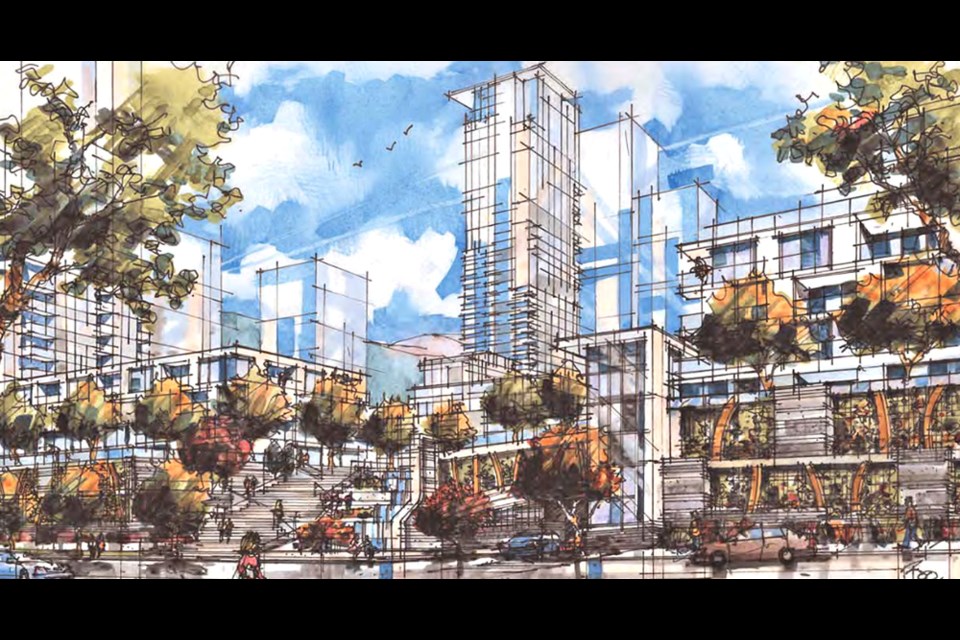A Port Moody councillor says a neutral third party should be enlisted to determine whether a tour offered to members of council by the proponent of the city’s largest redevelopment project in its history should be considered a secret meeting.
But Mayor Meghan Lahti dismisses any allegation of impropriety.
And the interpretation of rules that govern municipal meetings isn't entirely clear, says a report.
The tour, conducted at Wesgroup Properties’ River District project in Vancouver last Nov. 6, came to light during a public hearing Oct. 3 considering zoning amendments that would allow the company to proceed with its massive transformation of Port Moody’s Coronation Park neighbourhood.
Resident Jeff Poste said four councillors met with Brad Jones, Wesgroup’s senior vice-president of development, but “it is unlawful in BC for a quorum of council to meet to discuss any city business without calling a formal, recorded meeting.”
He accused the councillors who attended the tour of getting together in private to “decide the direction of the city.”
The accusation sparked Coun. Haven Lurbiecki to walk out of the council meeting that followed the public hearing, after her motion to defer any further consideration of the Coronation Park project until the matter could be investigated was defeated.
In a statement, Lurbiecki said, “the law is clear that a majority of council cannot meet in private to discuss specific business that will be considered at the council table.”
She said she couldn't continue participating in the meeting until the issue is addressed.
"The issue is not that councillors were invited somewhere by a proponent, it’s if a quorum majority met with an applicant about the rezoning application in private," Lurbiecki said.
While British Columbia’s Community Charter that regulates municipal affairs states meetings of council must be open to the public except under very particular circumstances, a special report published in 2012 by the office of the BC Ombudsperson acknowledges what constitutes a meeting isn’t specifically defined.
In fact, it says, “local governments are sometimes unsure about when an informal gathering is in fact a meeting subject to the open meeting requirements.”
Among the factors that could determine if a gathering is actually a meeting are:
- a quorum of council, board or committee members are present
- it takes place at the council or board’s normal meeting place or in an area completely under the control of the council or board
- it is a regularly scheduled event
- formal procedures are followed
- the attendees hold a vote the attendees are discussing matters that would normally form the basis of the council’s business and dealing with the matters in a way that moves them toward the possible application of the council’s authority
But a gathering is less likely to be considered a meeting if:
- there is no quorum
- it occurs in a location not under the control of council
- it’s not a regularly scheduled event
- it doesn’t follow formal procedures
- no voting occurs
- those in attendance are there strictly to receive information or to receive or provide training
The report doesn't indicate how many of the factors have to be in place to determine whether or not a gathering is a meeting.
But citing a precedent set in Yellowknife, it said "if a gathering shares some of the common features of a regular meeting, this may indicate that the gathering is in fact a meeting."
Lahti said the tour, which she was unable to attend, was nothing more than an opportunity for councillors to collect information.
“As far as I’m concerned, there’s no problem with that.”
Dilworth, who attended the tour, said it “was strictly an opportunity to see some of the best case scenarios of what Coronation Park could look like.”
In an email exchange with Wesgroup and shared with the Tri-City News, Lurbiecki indicated her interest in participating in the tour and her availability on several suggested dates.
Lurbiecki said the invitation was initially extended prior to council being sworn in. She said she subsequently decided “that I would not be meeting with developers in private.”
Wesgroup’s Jones said the invitation to tour the company’s River District project was sent to all members of council last October, shortly after the municipal election that saw four newcomers join three incumbents on council.
He said a similar offer was also made to the previous council.
Jones said the gathering would give the company “the opportunity to speak about the history of Coronation Park that led to approval of the OCP.”
In a follow-up email to councillors, Wesgroup’s senior development manager, Evan French, said the tour had been “a great opportunity to initiate conversation and some community building.”
He also referenced information that provided “some background on Wesgroup, an overview of opportunities and challenges with masterplan developments, a timeline of Coronation Park’s progress and a summary of each iteration of the project as it made its way through the OCP approvals process.”
In the Ombudsperson’s report, the BC Ombudsperson at the time, Kim Carter, said, “one of the cornerstones of open and transparent government in British Columbia is the requirement for local governments to conduct meetings that are open and accessible to the public” to foster trust and confidence in the decision-making process.
Following Lurbiecki’s departure from last Tuesday’s meeting, council gave unanimous support to third reading of the zoning amendments that will see the 14.8-acre neighbourhood of aging single-family homes at the corner of Ioco Road and Barnet Highway transform into a dense urban community with more than 5,500 new residents, a four-storey office building as well as retail spaces for a grocery and drug store.



